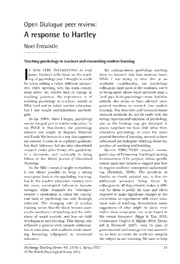
ERIC EJ978113: A Response to Hartley PDF
Preview ERIC EJ978113: A Response to Hartley
Open Dialogue peer review: A response to Hartley Noel Entwistle Teaching psychology to teachers and researching student learning I T WAS VERY INTERESTING to read My undergraduate psychology teaching James Hartley’s reflections on the teach- drew on research into how students learn. ing of psychology and I thought it would While I was trying to treat this as an be worth adding a rather different perspec- academic contribution, my psychology tive, while agreeing with his main conclu- colleagues (and most of the students) saw it sions about the relative lack of change in as being more about study methods than a teaching practices. My experience is of ‘real’ part of the psychology course. And that teaching psychology to teachers, mainly at attitude also seems to have affected more MEd level and in initial teacher education, general reactions to research into student but I also taught undergraduate psycholo- learning. The interview and inventory-based gists. research methods do not fit easily with the In the 1960s, when I began, psychology strong experimental tradition of psychology, was an integral part of teacher education. In and so the findings may get devalued. It my PGCE in Manchester, the psychology always surprised me how little ideas from element was taught by Stephen Wiseman education psychology, or even the more and Frank Warburton in a way that captured general theories of learning, seemed to have my interest. I came in as a physics graduate, influenced psychologists’ thinking about the but their influence led me into educational practice of teaching and learning. research under John Nisbet, who guided me Recent ESRC/TLRP research investi- to a doctorate, and eventually to being gated ways of Enhancing Teaching-Learning Editor of the British Journal of Educational Environments (ETL project) within specific Psychology. course units and helped to suggest how best In the MEd courses I taught to teachers, to support students’ conceptual understand- it was always possible to keep a strong ing (Entwistle, 2009). The problem, as conceptual basis in the psychology teaching, Hartley so clearly pointed out, is that the but in the teacher education courses, over additional pressures being faced by the years, sociological influences became colleagues in all departments makes it diffi- stronger, while demands for ‘relevance’ cult for them to justify the time and effort created a curriculum in which the concep- required to make significant changes in the tual basis of psychology was only fleetingly curriculum or experiment with more inno- reflected. The changing role of teacher vative ways of teaching. Nevertheless, many training meant that the focus became more suggestions of what might be done, even on the mechanics of teaching and the influ- within these constraints, are to be found in ences of social context, and less on child the recent literature (Biggs & Tan, 2011; development and learning. This change also Christensen Hughes & Mighty, 2010; Houn- reflected a general drift towards utilitarian- sell & Hounsell, 2007). And, in spite of ism in education, with academic understand- governmental and managerial instrumental- ing becoming subjugated to vocational ity, we have to retain the academic integrity relevance. the subject in our teaching. We have to help Psychology Teaching Review Vol. 18 No 1, Spring 2012 13 © The British Psychological Society 2012 Noel Entwistle students to think and act like professionals References and develop a lasting feel for the subject and Biggs, J.B., & Tan, C. (in press). Teaching for quality love of learning, and that can be guided by learning at university: What the student does. Society for Research into Higher Education & the relevant research findings (McCune & Open University Press. Entwistle, 2011). Christensen Hughes, J. & Mighty, J. (2010). Taking stock: Research on teaching and learning in higher Correspondence education. Montreal: McGill-Queen’s University Noel Entwistle Press. Entwistle, N.J. (2009). Teaching for understanding at Professor Emeritus university: Deep approaches and distinctive ways of School of Education, thinking.Basingstoke: Palgrave Macmillan. Moray House Campus, McCune, V. & Entwistle, N.J. (2011). Cultivating the University of Edinburgh, disposition to understand in 21st century univer- Edinburgh, EH8 8AQ. sity education. Learning and Individual Differences, 21, 303–310. Email: [email protected] Hounsell, D. & Hounsell, J. (2007). Teaching-learning environments in contemporary mass higher education. In N.J. Entwistle & P.D. Tomlinson (Eds.), Student Learning and University Teaching. British Journal of Educational Psychology Mono- graph Series II, Number 4 (pp.91−111). Leicester: British Psychological Society. 14 Psychology Teaching Review Vol. 18 No. 1, Spring 2012
